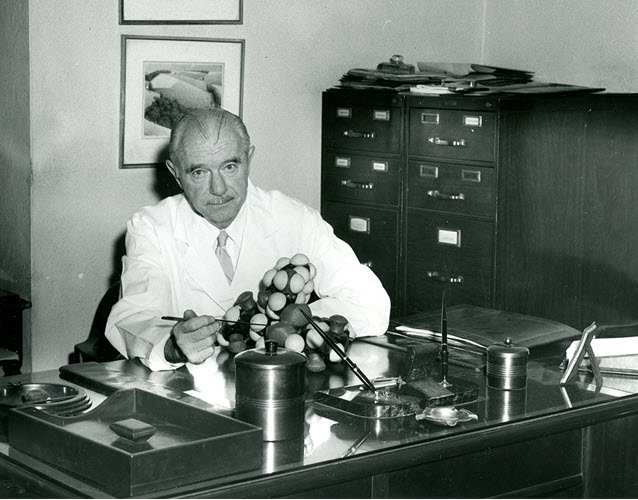Vincent du Vigneaud (18 May 1901 – 11 December 1978) was a renowned biochemist and Nobel laureate who made significant contributions to the field of biochemistry.
Life and Career
He was born on 18 May 1901, in Chicago, Illinois, United States. He attended the University of Illinois at Urbana-Champaign, where he earned a bachelor’s degree in chemistry in 1924. He went on to earn a master’s degree in chemistry from the same institution in 1925. He then went to the University of Rochester, where he earned his Ph.D. in biochemistry in 1927.
After completing his Ph.D., he began his career as a biochemist. He worked at several universities and research institutions, including Harvard University, the University of Rochester, and the National Institutes of Health.
His research focused on the structure and function of peptides and proteins. He made several significant discoveries in this field, including the identification of the amino acid cystine and the synthesis of oxytocin, a hormone that plays a crucial role in childbirth and breastfeeding.
He died on 11 December 1978, in New York, United States.
Award and Legacy
He was awarded the Nobel Prize in Physiology or Medicine in 1955, for his work on oxytocin. He shared the award with two other researchers, Ernst Chain, and Sir Alexander Fleming.
In addition to the Nobel Prize, du Vigneaud received numerous other awards and honors throughout his career. He was elected to the National Academy of Sciences in 1949 and served as its president from 1963 to 1969.
Du Vigneaud also received the National Medal of Science in 1966 and the Priestley Medal, the highest honor of the American Chemical Society, in 1970.
His contributions to biochemistry have had a lasting impact on the field. His work on peptides and proteins paved the way for further research in this area, and his synthesis of oxytocin has had important implications for reproductive medicine.
Today, du Vigneaud is remembered as a pioneering biochemist and a dedicated researcher. His legacy continues to inspire new generations of scientists and researchers to push the boundaries of knowledge in the field of biochemistry.

